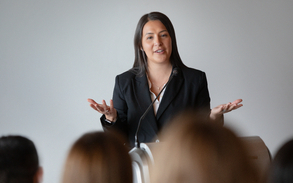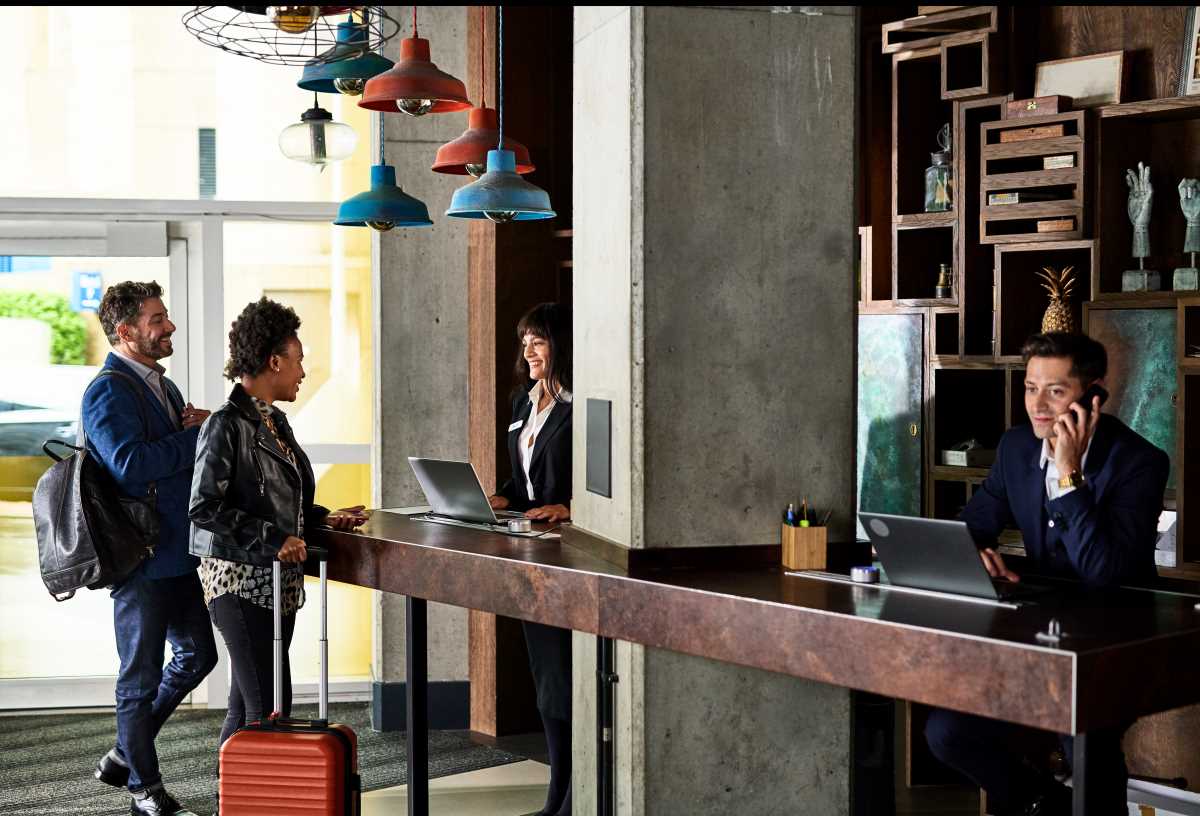If you’re considering a hospitality career, it’s important to look at the skills you need to focus on for success. Communication is one of the most important skills in both your personal and professional life and is essential in hospitality.
Impactful communication allows us to work better with others, ensures guests get the help they need and boosts our ability to relate to those around us, which is useful in every walk of life.
In this article, we’ll go over what effective communication is, how it can help you prepare yourself for leadership in the hospitality industry, plus how it can assist you in your personal life.
We’ll also discuss the specific communication skills that will help you in your hospitality career, as well as the best ways to learn and improve your communication.
Understanding effective communication
The first thing to understand about communication is that there are different techniques. The two most common are verbal and non-verbal, which cover most types of communication.
Verbal communication is, of course, talking to people, while non-verbal communication includes anything that isn’t said or heard. Some of the fundamentals of communication include:
- Spoken communication: talking clearly and concisely
- Listening: communication is a two-way street and it’s important to listen as well as talk. Listening can help you understand what other people need or what they feel is important
- Active listening: this goes beyond simply hearing what someone else says. It includes asking questions to check you understand what they’ve said, using signals to confirm you’re listening and focusing wholly on the person talking
- Written communication: from emails to compiling reports, written communication is a vital part of everyday life
- Sign language: while this is often thought of as a replacement for verbal communication, it also expresses emotions and other nuances. It’s vital for people who are hard of hearing, deaf or cannot speak easily
- Body language: we communicate all kinds of information with our posture and expressions and can become skilled at reading the body language of people we interact with
The goal of effective communication is to make sure you can clearly understand others and put across points of your own. Clear communication helps us in all our interactions with everyone we meet.
Of course, it’s also important to note there can be major communication barriers, such as different languages or cultural aspects that can make effective communication more complex.
Why is communication important in hospitality?
Communication allows us to interact with other people more easily. The importance of communication in hospitality is directly related to the fact you’re offering a service to people and you need to make sure you can deliver what they need or expect.
Think of any time you’ve been at a hotel or restaurant and you’ll see how important it is to communicate well with guests. It’s also important to foster effective communication in teamwork so your entire team knows exactly what they are meant to be doing.
Communication is also vital to quickly discovering any problems and rectifying them as easily as possible.
Communication skills in personal relationships

As we’ve already mentioned, communication skills aren’t just for the workplace. Some interpersonal communication techniques include:
- Active listening
- Expressing emotions
- Verbal communication
- Emotional intelligence
Why is effective communication important in personal relationships?
Having good interpersonal communication skills can help you build strong personal relationships. Good communication in relationships requires being able to express your emotions, thoughts and needs effectively and the ability to listen when other people express theirs.
As well as building initial friendships, this will help you resolve conflicts and build a better understanding of the people you care about.
The benefits of effective communication on career growth in the hospitality industry
Communication skills in hospitality can help you have a successful career because clear and direct communication is needed for most roles in hospitality. In front-of-house roles, you’ll need to communicate with guests and customers.
In all roles, you’ll need to communicate well with your co-workers and team members.
Excellent communication skills aren’t just important for a communications manager either. Anyone working in hospitality can benefit from working on their communication because it will help them be more efficient in their role.
Good communication techniques will also help you build up a professional network, which can help drive your career.
Our BBA in Global Hospitality Management delivers the skills vital for making your mark in hospitality, including communication for exceptional outcomes.

Serious about your hospitality career?
Insights on the latest industry trends, career development advice, and program releases from one of the world’s leading hospitality schools.
We respect your privacy. Unsubscribe at any time.
How does effective communication contribute to professional success?
As well as helping you progress, good communication in the workplace can support your professional success by:
- Boosting morale for you and your co-workers
- Resolving conflicts or problems more quickly
- Boosting productivity
- Improving employee engagement
- Improving job satisfaction for you and your team
Key communication skills for success in the hospitality industry
There are many business communication skills that can help you in a hospitality management career. Some of the most important to develop include:
- Active listening and empathy with team members and guests, building a company culture of communication
- Clear and concise verbal and written communication, including different communication channels such as email, social media, long-form writing and more
- Nonverbal communication and body language
- Understanding cultural communication differences so you can communicate with anyone, whatever their background
- Conflict resolution and the ability to navigate issues impartially
Enhancing customer service through effective communication

Customer service and customer satisfaction are vital in hospitality careers such as hotel management. How satisfied your customers and guests are will directly affect your bottom line.
The happier your guests are, the more profit your company can make. One significant way to improve customer satisfaction is to deliver appropriate and friendly communication.
Guests want to feel they can seek help if they need it and they want to feel they’re being listened to.
Even before welcoming a guest to a hospitality venue, you’ll need productive verbal and written communication in all interactions you have with them.
Once a guest is on-site, communication needs to include empathy, patience and appropriate body language. You’ll also need to include cross-cultural communication for many guests since the hospitality industry attracts customers from all over the world.
Overcoming barriers to effective communication
Of course, communication is not always easy and there are some communication barriers you may need to work around. Some of the most common barriers – and ways to deal with them – include:.
- Language barriers: in hospitality, you’ll often be working with people who speak different languages. This can be overcome with patience, consideration and openness to learning
- Emotional barriers: when people are under stress or confused, it can be harder to communicate with them. Empathy and patience can help
- Ability barriers: it’s always important to consider people who might be hard of hearing or have other communication limitations. Being familiar with basic sign language or having technological solutions – or even just a pen and paper – can help
- Different communication channels: not everyone prefers the same type of communication, so it can be useful to know how to communicate via email, phone, face-to-face or whichever other channel a guest prefers
Developing and improving communication skills
Communication is a skill where continuous learning and professional development can help ensure you’re always improving.
Getting a hospitality degree will help you develop great communication skills tailored to the industry. If you’re already working in the hospitality sector, you could look at advanced learning, such as an executive MBA, which lets you study while you work.
It’s also important to be open to new communication styles. You can learn many new skills and styles by practicing your communication with work colleagues and team members.
Our MBA combines expert teaching, networking and priceless real-world experience to advance your career in hospitality leadership.

The role of technology in effective communication
With technology being ever more prevalent in daily life, there has also been a surge in tech-led communication techniques.
For example, many hotels now use digital platforms such as email and social media to engage guests and apps that let hotel guests request items such as additional bedding, which helps streamline processes.
Remote and hybrid working are now supported by technology and tech allows employees to communicate internally with other team members at any time.
Effective communication for teamwork and collaboration

Effective communication skills are also vital for teamwork or when collaborating with other departments and teams.
A great deal of communication in leadership revolves around finding a method that works for your team, for example, a notice board, a daily email or regular meetings.
Establishing the right communication type can help make sure your team runs smoothly, taking the communication skills and preferences of your team members into account.
Effective communication: conclusion
Communication is essential in all areas of life, including professional and personal.
Vital skills include written and verbal communication as well as conflict resolution, active listening, emotional intelligence and communication styles adapted to different cultures.
Effective workplace communication is one of the crucial hospitality skills you will need to succeed in a hospitality management career, so it’s important to develop it.
If you want to improve your skills and learn the communication strategies that can support your hospitality leadership path, our hospitality school has courses on offer to suit anyone at any stage in life.
Our courses offer expert theoretical study and hospitality internships to give you hands-on knowledge of the industry that can lead to success.
Photo Credits
Main Image: 10’000 Hours /DigitalVision via Getty Images




